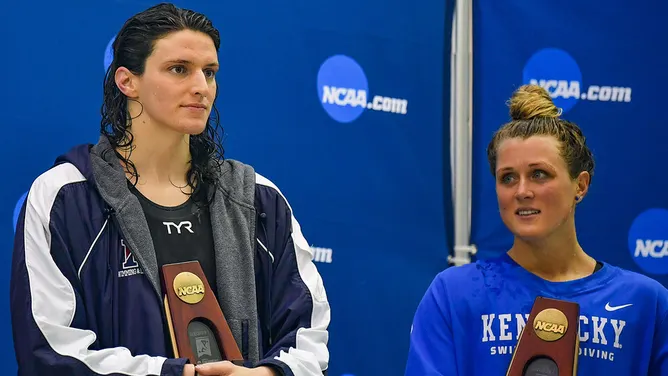
Lia Thomas Loses Legal Fight, Olympic Dream Dashes in Major Victory for Women’s Sports
Transgender swimmer Lia Thomas won’t be able to compete in the women’s category at the 2024 Paris Olympics, marking a significant win for fairness in women’s sports.
Thomas, a biological male who made history by claiming a women’s national championship in 2022 while swimming for the University of Pennsylvania, has officially lost a legal battle against World Aquatics. Thomas had argued that the organization’s ban, which prevents athletes who’ve experienced male puberty from competing in women’s events, was “invalid and unlawful.”
In the summer of 2022, World Aquatics ruled that any swimmer who had gone through “any part of male puberty” would be excluded from competing in female categories. This decision kept Thomas out of the pool with women competitors.
In response to the court’s decision to uphold this rule, World Aquatics hailed the ruling as a “major step forward” in their ongoing commitment to protecting women’s sports. The organization emphasized its dedication to ensuring fairness and equal opportunities for athletes across all genders.
“World Aquatics is committed to fostering an environment of respect, fairness, and equal opportunities for all athletes, regardless of gender,” the organization stated, as reported by The Guardian.
It’s important to note that World Aquatics has not outright banned transgender athletes from competition. Instead, the organization introduced an “open” category specifically for transgender swimmers. However, when the category debuted at the 2023 Berlin World Cup, it failed to attract a single participant.

Lia Thomas’ Olympic Hopes End as Court Upholds Ban — A Win for Fairness in Women’s Sports
A defining moment in the ongoing debate over fairness in women’s athletics has arrived. Lia Thomas, the transgender swimmer who sparked national debate after winning an NCAA title against biological females, will not have the chance to compete in the 2024 Paris Olympics.
In a photo that once symbolized the controversy, Thomas is seen standing beside OutKick’s Riley Gaines after securing that NCAA victory. While Thomas was an average competitor in the men’s division, the NCAA win in the women’s category brought intense scrutiny and fueled a broader discussion about the integrity of female sports.
Now, Thomas is no longer a member of U.S. Swimming — a detail that factored into the court’s recent decision, making it easier to dismiss the attempt to overturn World Aquatics’ eligibility policy.
According to the ruling:
“The panel concludes that since the Athlete is not entitled to participate in ‘Elite Events’ within the meaning of USA Swimming Policy… she is simply not entitled to engage with eligibility to compete in WA competitions.”
In other words, because Thomas is neither registered with World Aquatics nor actively competing at the elite level, the organization’s eligibility rules don’t even apply in a way that would justify legal intervention.
Looking ahead, the U.S. Olympic Swimming Trials will kick off on June 15 in Indianapolis — for the first time ever, staged inside Lucas Oil Stadium, typically home to football. The excitement surrounding the event will now center on biological women competing for a chance to represent Team USA on the world’s biggest stage.
Back in 2022, Thomas expressed a strong desire to reach the Olympics, saying during an interview with Good Morning America:
“It’s been a goal of mine to swim in Olympic trials for a very long time and I would love to see that through.”
That dream, however, has officially come to an end.
In a decision widely hailed as a victory for fairness and common sense, female athletes will now have an unchallenged opportunity to earn their place on the women’s team and represent the United States in Paris.